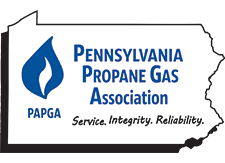Pennsylvania Propane Gas Association
Training Course Descriptions
PAPGA PEP classes offered are not complete pathways developed by PERC and are not advertised as full pathways.
Students that enroll in PAPGA sponsored PEP training programs MUST not enroll and/or start a PEP pathway online.
Click HERE to view or print Training Information & Class Descriptions
Basic Pep (New PEP Course)
PEP Fundamentals of Propane course provide insights into the origins production, and uses of propane. It will also address chemical compounds and propane reactions to heat and pressure as well as safety measures.
Pathway programs/modules covered are:
• Introduction to the Propane Industry
• Fundamentals of Propane
• Handling Propane Leaks
• Consumer Safety Education
**Bobtail Delivery PEP (New PEP Course)
This course provides information for drivers who operate commercial motor vehicles to deliver propane. Primarily designed to train employees who operate a bobtail, the most common vehicle used for transporting and delivering propane to individual customers.
Pathway programs/modules covered:
• Inspect Commercial Motor Vehicle
– Bobtail Components
• Preparing to Load a Bobtail
• Load a Bobtail with a Liquid Pump
• Filling Customer Containers
**Cylinder Delivery PEP (New PEP Course)
This course provides information for drivers who deliver propane cylinders. Primarily designed to train employees who deliver cylinders on how to load, secure and unload propane containers along with inspecting a cylinder delivery vehicle.
Pathway programs/modules covered:
• Inspect Commercial Motor Vehicle
– Cylinder Delivery Vehicle
• Loading Propane Containers
– Load, Secure & Unload Propane Containers
– Load, Secure & Unload DOT Cylinders
– Load & Secure Propane Containers up to 2,000gal
**Bobtail Delivery PEP & Cylinder Delivery PEP classes will also cover the pathway/modules:
Pathway program electives for delivery classes:
• Restoring Service after an Interruption of Service
• Measuring Pressure
• Testing Gas Piping
• Lighting Appliance Pilots
Safe Driving (New PEP Course)
This course will explore how to drive defensively and be more aware on the road, and how to prevent the three most common types of accidents in our industry: rolling over, rear-ending other vehicles, and backing into something.
Cylinder Requalification (Required to obtain a RIN#)
This class covers general requalification requirements, visual inspection, pressure retest, cylinder rejection and condemnation, re-tester markings, and record keeping. After completing this course, you will be able to:
• Identify the properties and characteristics of propane.
• Identify the different types of DOT cylinders.
• Identify DOT requirements for cylinder requalification.
• List the process steps for DOT cylinder requalification by visual inspection.
• Requalify DOT cylinders by visual inspection and document findings.
• Review code requirements for cylinder storage at plant and customer locations.
• Review installing cylinder cages.
Gas Check
This course provides the propane industry with voluntary guidelines for conducting residential and small commercial safety inspections. Conducting a residential or small commercial safety inspection is a critical task for propane professionals and is the key component of keeping customers comfortable and safe.
This class offers two types of inspections:
1. A ‘Gas System Check’ which can be completed on the gas delivery system, including the containers, regulators, and appurtenances.
2. A ‘Gas Appliance System Check’ which can be completed on the gas delivery system and all propane-burning appliances.
CETP Designing & Installing Exterior Distribution Systems 4.1
This class will focus on designing and installing the exterior of a vapor distribution system for both residential and small commercial markets.
Course objectives include:
• Properly determine an effective system load.
• Identify factors affecting selection of a properly sized container.
• Select and install an appropriate container for a vapor distribution system.
• Identify requirements for establishing a container location.
• Identify how to properly select, size, and install pipe and tubing for a vapor distribution system.
• Explain how to analyze and prevent corrosion.
• Identify the steps to sizing, selecting, and installing regulators.
• Describe how to properly select and install a vapor meter.
• Discuss primary special installations that correspond with a vapor distribution system.
CETP Placing Distribution Systems & Appliances into Operation 4.2
This class focuses on the interior portions of the piping system and on the checks and tests required when installing new piping and regulators or restoring service to an existing vapor distribution system.
Course objectives include:
• Identify the different vapor distribution systems and appliance checks and tests to recognize the steps to perform them.
• Explain the general procedure for placing a vapor distribution system into operation and when to make the final connection to turn on the system.
• Identify how to validate container, pipe and tubing, regulator, and vapor meter installations.
• Understand the importance of proper venting, combustion air, and purging.
• Identify appliance controls and safety devices and understand their purpose.
• Understand the basic characteristics of burning propane to include the components of a burner, air adjustments, and flame abnormalities.
• Understand the importance of communicating customer safety information.

 Mower Equipment
Mower Equipment